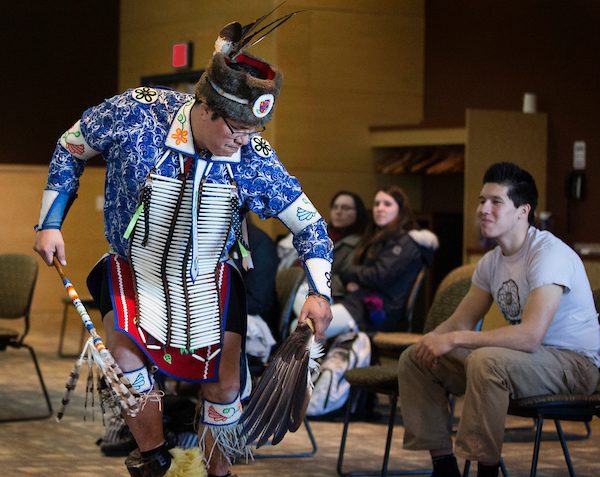Honoring Indigenous People

UW-WHITEWATER PHOTO/CRAIG SCHREINER
Mino-Giizhik DeBungie performs a hunting dance watched by students including UW-Whitewater criminology major Cody Wing, who is president of the Native American Cultural Awareness Association. Debungie is a member of the Red Cliff Band of Lake Superior Chippewa and Wing is a member of the Bad River Band of Lake Superior Chippewa. Six members of the Red Cliff Band of Lake Superior Chippewa from Bayfield County in northern Wisconsin visited UW-Whitewater to talk with students about native culture and perform traditional dances, drumming and singing. Classes in restorative justice, American Indian studies and dance participated through the afternoon on Wednesday, March 6, 2019. (UW-Whitewater photo/Craig Schreiner)
October 11, 2020
The UW-Whitewater Native American Cultural Awareness Association (NACAA) honors Indigenous Peoples’ Day Monday, Oct. 12. It coincides with the federal holiday of Columbus Day, however, many states are instead moving to recognize Indigenous Peoples’ Day to respect those who lived in the Americas before Christopher Columbus’s discovery. Wisconsin established the holiday in 2019 to promote Native American history. The Native American Cultural Awareness Association works to grow acknowledgement of the annual holiday held the second Monday of October.
“NACAA is here on campus to not only teach students and faculty members about indigenous communities, but also the community around Whitewater – to educate people about different indigenous communities, past, present and future,” said association president Corissa Fargo.
The UW-W campus itself sits on land previously occupied by Native peoples such as the Ho-Chunk, Potawatomi, Ojibwa and Odawa. The university formally recognizes and honors the lands on which it resides in a Land Acknowledgement Statement. UW-Whitewater has also recently named a new residence hall “Ma’iingan Hall,” which translates to “wolf” in Ojibwe.
Students are typically told growing up that Christopher Columbus found the Americas after sailing across the Atlantic Ocean. Columbus’s voyages had a historical impact on the way Europeans used waterways, and spurred many voyages across the ocean for trade and colonization. However, Columbus is also regarded as a violent figure in history for the way he treated Indigenous communities he encountered when he arrived. Consequently, many states don’t recognize the Columbus Day holiday.
“It’s just telling a partial story and we want our national holidays to not tell a partial story,” said Rossitza Ivanova, professor of American Indian literature.
This year the celebration of Indigenous Peoples’ Day will operate differently due to the COVID-19 pandemic. UW-Whitewater celebrations will be mainly celebrated virtually. But the Native American Cultural Awareness Association still continues to encourage appreciation of Indigenous people while also acknowledging the inequalities that are ongoing today in the 21st Century.
This acknowledgement has led to some positive advances in respect for Native people such as the name change of the Washington Football Team, which previously had a racially insensitive name and mascot. Statues of Christopher Columbus have been taken down in cities across the nation.
“It’s really great to be able to have a space where we can have these conversations. I think that’s one of the basic things – that we just don’t talk about it,” said co-adviser Holly Denning.
For more information about the UW-Whitewater Native American Cultural Awareness Association, virtual meetings are held every Thursday from 5 – 6 p.m.












